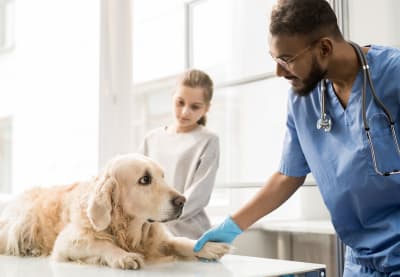Anemia in dogs is a symptom of a potentially serious underlying condition. Our Clemmons vets explain the condition, symptoms, and how it’s treated.
What is anemia in dogs?
If your dog does not have enough hemoglobin or red blood cells (occasionally both) circulating in his bloodstream, this is known as a condition called anemia. Red blood cells are essential - they supply oxygen to the rest of your dog’s body and remove carbon dioxide. Hemoglobin is the protein inside these cells, and it carries oxygen.
A dog’s red blood cells are produced in his bone marrow and circulate for approximately three months. At this time, they break down and are replaced, and the cycle repeats in healthy dogs.
In sick or injured dogs, this process is interrupted and anemia can occur from a number of diseases, injuries or conditions, including:
- Hypothyroidism
- Parasite infestations (hookworms, roundworms, fleas, ticks, etc.) which result in blood loss
- Cancer
- Immune diseases, in which healthy blood cells are attacked by the immune system
- Canine influenza, parvovirus and other infectious diseases
- Poor nutrition
Certain dogs or breeds may be predisposed to diseases or conditions which are known to cause anemia. Ask your veterinarian about any health-related risks your dog may have, and what can be done to prevent them or reduce the chances your pup will suffer from them. This way, you’ll be aware of signs and symptoms to look for.
What are symptoms of anemia in dogs?
Anemia is tricky - though it can be one of many symptoms that manifest due to an underlying condition, it’s possible that it may be the only symptom you see. Regardless, you should watch for these symptoms of anemia in your dog:
- Fatigue; running out of energy easily during play or exercise
- Dark or “tarry” stools, or dark blood in feces or vomit
- Change in color of gums (whitish or pale pink)
- Bruising on skin (from loss of platelets)
What should I do if I think my dog is suffering from anemia?
Visit your veterinarian as soon as possible; in particular, blood in feces or vomit is an emergency that needs immediate tending.
Anemia needs to be officially diagnosed and tested to find out which type of anemia your dog has, and what’s causing it. Your veterinarian may do a series of blood tests for diagnostic purposes, in addition to ultrasounds, x-rays and imaging.
Blood tests can include the PCV (packed cell volume) test, which measures the percentage of red blood cells in your dog’s blood stream. If his levels register at lower than 35 percent, he’d be classified as anemic.
Other tests can include blood smears and bone marrow biopsies, which can help your vet find out whether the anemia is responsive or unresponsive.
If your dog is diagnosed with responsive anemia, this means their bone marrow is attempting to correct the anemia. But if their bone marrow is not responding as it should, this would be unresponsive anemia. Hemolytic anemia occurs when a dog’s body destroys or loses red blood cells.
How is anemia in dogs treated?
The answer to this question depends on the severity of anemia in your dog - he may need a blood transfusion. Your vet will develop a custom treatment plan to treat the underlying condition. Depending on the condition, treatment options could range from medications to surgery.
Is anemia fatal for dogs?
Anemia is a serious symptom, and may be caused by conditions ranging from autoimmune disorders to injury, toxins or diseases. Contact your veterinarian immediately for help, as the cause and treatment of the anemia will determine your dog’s prognosis.
Note: The advice provided in this post is intended for informational purposes and does not constitute medical advice regarding pets.
Do you suspect your dog is anemic? Our veterinarians are experienced in diagnosing and treating a wide range of conditions in pets. Contact our Clemmons animal clinic today for advice.
Looking for a vet in
Clemmons?
We're always accepting new patients, so contact our veterinary hospital today to book your pet's first appointment.
Related Articles View All
Grooming Anxiety in Dogs - Tips to Calm Your Anxious Dog
Does your dog become anxious and scared when it comes to grooming time? Here, you will find helpful tips to soothe your dog's nerves and make a trip to the groomer a happy adventure.
Checklist for a Successful First Vet Visit for Your Puppy
It's your puppy's first vet visit. What do you need to bring? What happens at a puppy appointment? Today, we provide tips to help make your puppy's first vet visit successful.
What to Do About Diarrhea in Dogs
Dog diarrhea is a messy problem most pet parents find themselves dealing with at some point. So, what causes diarrhea in dogs and how can you stop it? Read on to find out.
Kitten First Vet Visit - What to Expect & What it Will Cost
Have you welcomed a beautiful new kitten into your heart and home? If so, early veterinary care can help to set your tiny fur baby on the path to excellent life-long health. Today, our Clemmons vets discuss kitten first vet visits.
What Should You Do if Your Dog is Losing Their Hair?
Is your dog experiencing patchy hair loss, bald patches, or all-over thinning of the coat? Could be allergies, seasonal shedding, or more severe conditions such as alopecia. Our Clemmons vets delve into the topic of dog hair loss in dogs and what to do.

